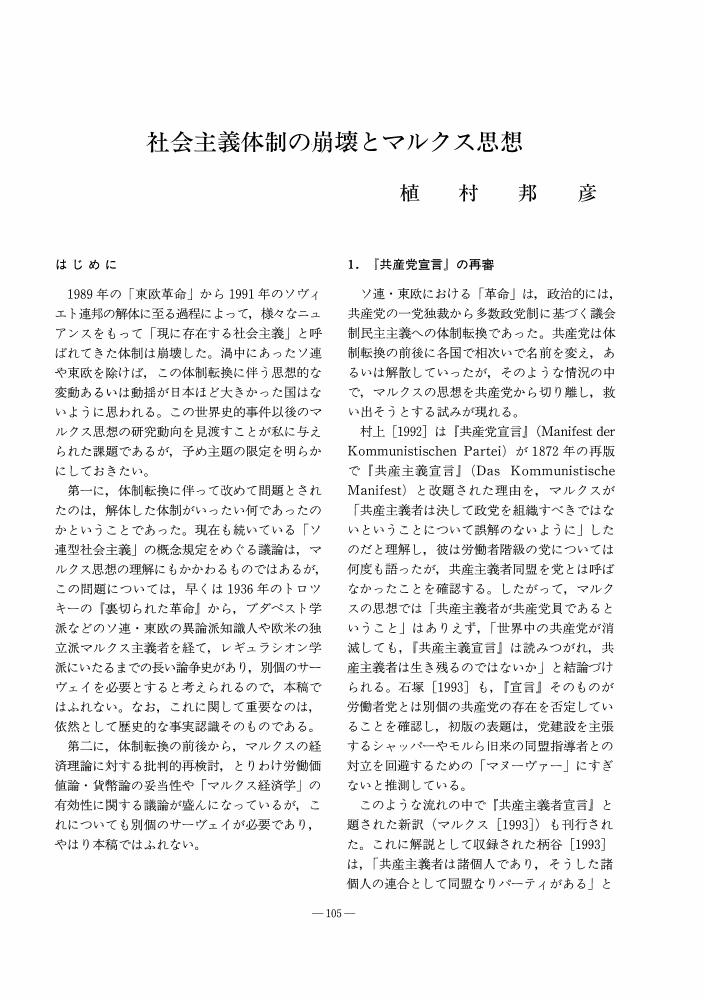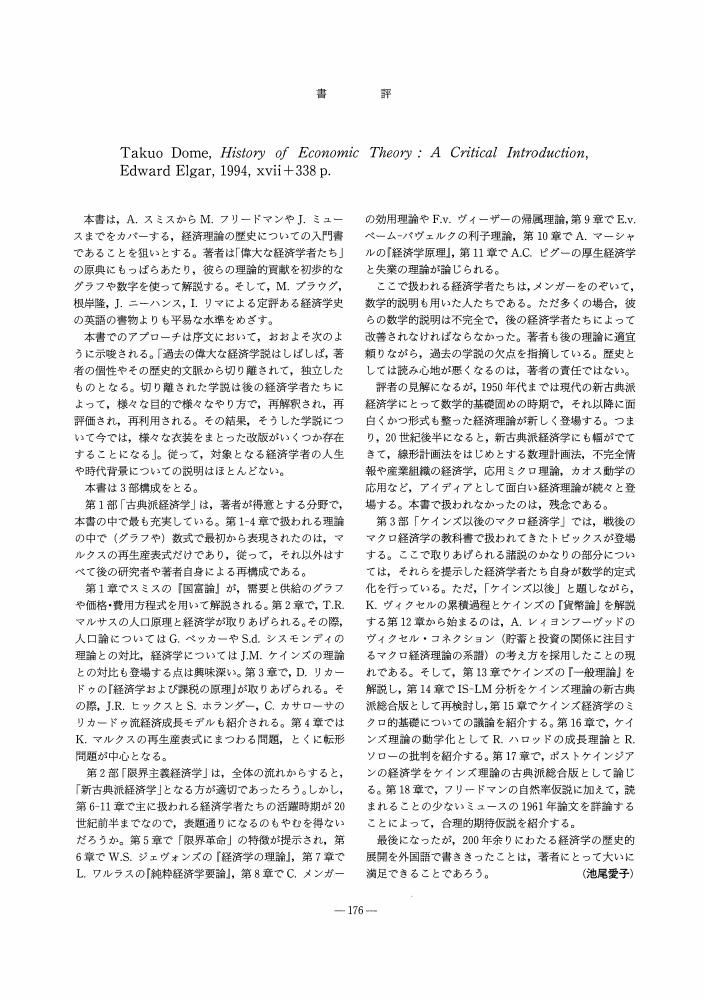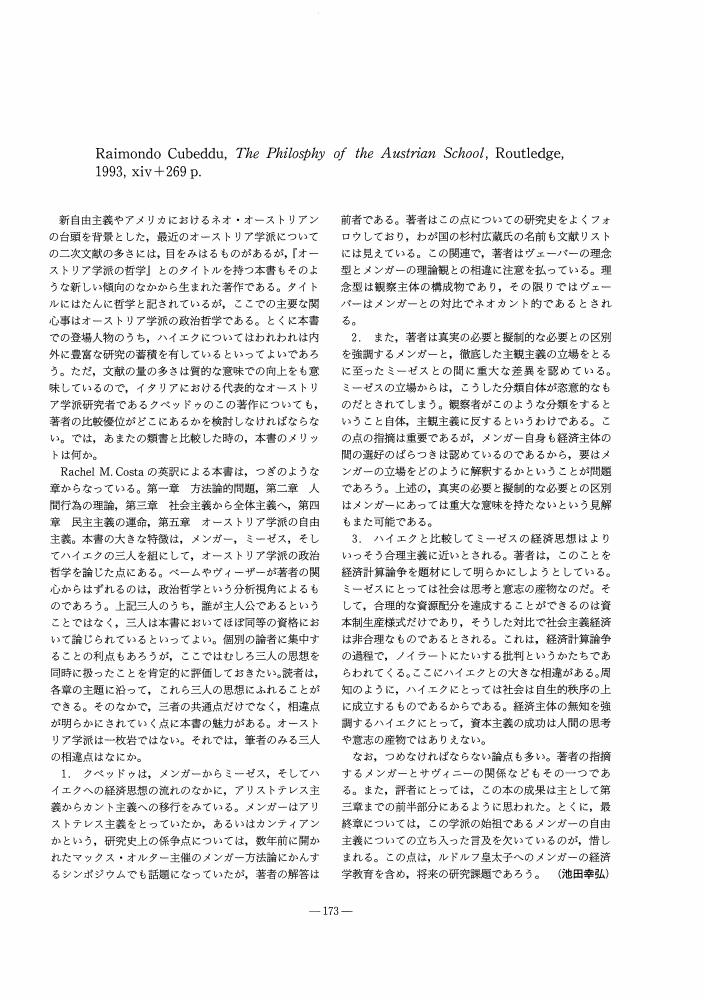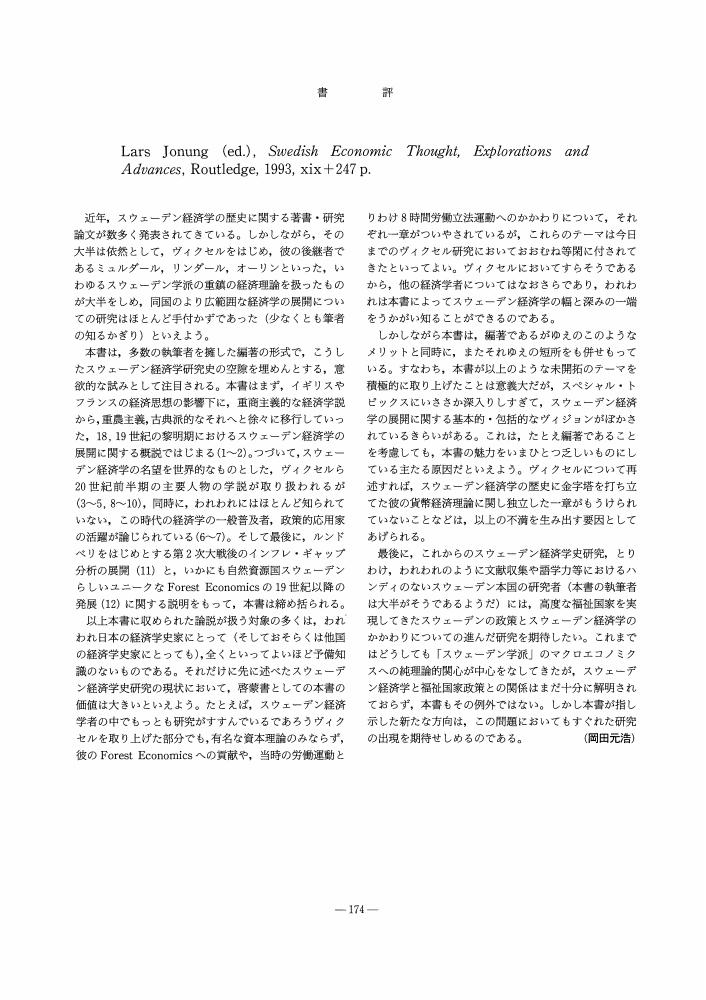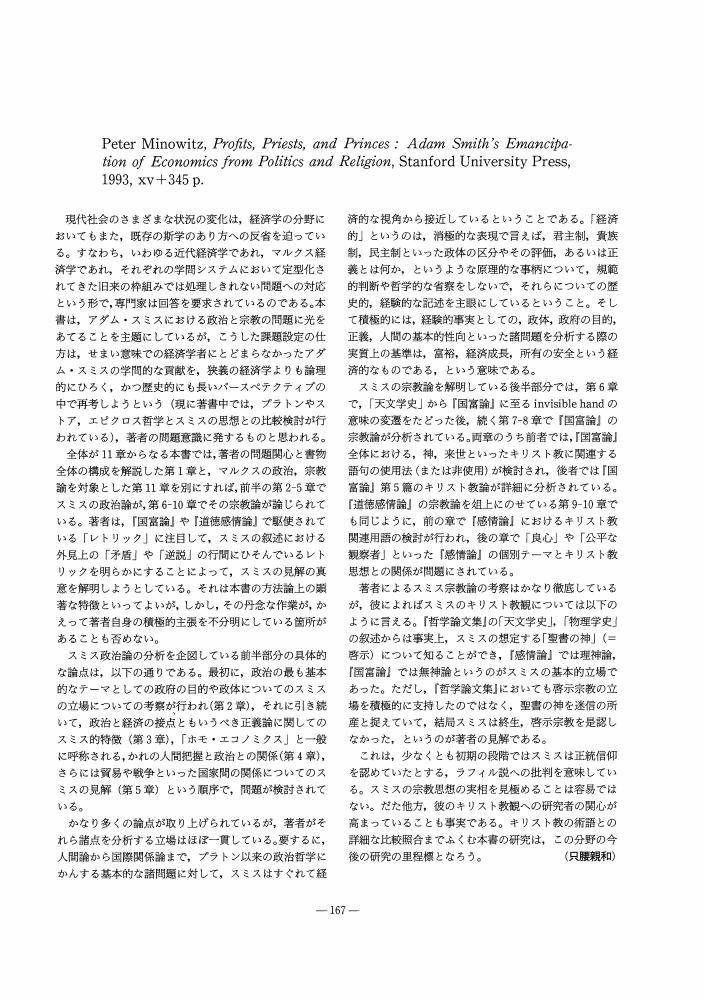- 著者
- 太田 仁樹
- 出版者
- The Japanese Society for the History of Economic Thought
- 雑誌
- 経済学史学会年報 (ISSN:04534786)
- 巻号頁・発行日
- vol.34, no.34, pp.136, 1996 (Released:2010-08-05)
1 0 0 0 OA ハイエクと制度進化の経済学
- 著者
- 池田 幸弘
- 出版者
- The Japanese Society for the History of Economic Thought
- 雑誌
- 経済学史学会年報 (ISSN:04534786)
- 巻号頁・発行日
- vol.34, no.34, pp.40-52, 1996 (Released:2010-08-05)
- 参考文献数
- 39
Hayek has been one of the major figures in the history of economic thought who has been interested in the evolution of institutions. Considered in this paper is the relationship between Hayek and Carl Menger, the founder of the Austrian School of Economics. Although they shared the basic concept of spontaneous order, as previous literature shows, they have a totally different idea about one important institution, the state. In Hayek's opinion the state is not a spontaneous order, but an organization made from above. Menger saw the matter differently. He tried to capture the state as a system which can be reduced to the self-interest of economic agents. Thus, in Menger's view, the state is a good example of spontaneous order.
1 0 0 0 OA J. S. ミルの社会科学論
- 著者
- 松井 名津
- 出版者
- The Japanese Society for the History of Economic Thought
- 雑誌
- 経済学史学会年報 (ISSN:04534786)
- 巻号頁・発行日
- vol.34, no.34, pp.53-64, 1996 (Released:2010-08-05)
- 参考文献数
- 35
This paper examines the purpose and intentions underlying Mill's methodological treatises. From “a priori” method to “concrete deductive method” Mill struggled for the method of social science that would be more sensitive to complexity and diversity, on which a new social science would build. Mill agreed with Comte for the need of a new science but rejected his sociology, because Mill intended to construct a new social science to guide public opinion, not to dominate it. On the other hand, Mill saw contemporary economists as narrow-minded neglecting the truth or vision that would guide human action. To write “Principles of Political Economy”, for Mill was more than to show the truth of economic phenomena by the concrete deductive method. It was to show the public the prospect of transition and its possibie, desirable way.Along this line, Mill criticized “mercantilism” as seeing only material goods, especially money, as wealth, then extending the notion to the means that fulfill one's purpose effectively. In doing this Mill went close to the ethical-economic approach by A. K. Sen.
1 0 0 0 OA ウェッブにおける労働組合運動論と社会改革構想
- 著者
- 江里口 拓
- 出版者
- The Japanese Society for the History of Economic Thought
- 雑誌
- 経済学史学会年報 (ISSN:04534786)
- 巻号頁・発行日
- vol.34, no.34, pp.65-76, 1996 (Released:2010-08-05)
- 参考文献数
- 39
The purpose of this paper is to show the character of the Webbs' theory of trade unionism through examining its relationships with their social reform scheme.The scheme is based on Sidney's three essays, which make it clear that the mechanism of ‘industrial progress’ is worked by competition among firms for greater ‘rent’ of ‘ability’ and of ‘capital’.In Industrial Democracy, the Webbs argue that this mechanism should be accelerated by the minimum labour conditions which the trade union regulates, and propose the supplement of this regulation by a legislated ‘national minimum’. This proposal is founded in their recognition, in The History of Trade Unionism, that trade unionism has already changed from a negative political action to a positive one.Before studying trade unionism, they had already analysed the consumer's cooperative movement and the municipal government and realised that trade unionism was profitable for the improvement of consumers' or citizens' livelihoods. Thus, the theory of trade unionism was introduced into their social reform scheme, and the scheme was reinforced by the theory.The Webbs' theory of trade unionism is a part of their social reform scheme for improving the nation's livelihood.
1 0 0 0 OA マーシャル『産業と商業』の動態論
- 著者
- 藤井 賢治
- 出版者
- The Japanese Society for the History of Economic Thought
- 雑誌
- 経済学史学会年報 (ISSN:04534786)
- 巻号頁・発行日
- vol.34, no.34, pp.77-88, 1996 (Released:2010-08-05)
- 参考文献数
- 27
The economics of Marshall has long been assessed mainly on The Principles of Economics; besides, the assessment centered on the partial-equilibrium aspect of it. Although Marshall himself recommended and pursued a biological economics, his attempt has been evaluated as merely a promise. This paper examines Industry and Trade, which has practically been ignored as far as its theoretical aspect is concerned. One can find ‘standardization’ plays the key role in the historical accounts of that book. ‘Standardization’ which means more common knowledge possessed by members of an organization, is caused by habitual behaviours of agents or institutional arrangements agreed upon and promotes the development of that organization, thereby increasing the productivity of it. ‘Standardization’ captures an interaction of men and environments in an economic sense and provides Marshallian economics with the dynamics necessary for organizational growth.
1 0 0 0 OA 社会主義体制の崩壊とマルクス思想
- 著者
- 植村 邦彦
- 出版者
- The Japanese Society for the History of Economic Thought
- 雑誌
- 経済学史学会年報 (ISSN:04534786)
- 巻号頁・発行日
- vol.34, no.34, pp.105-111, 1996 (Released:2010-08-05)
- 参考文献数
- 42
1 0 0 0 OA 〈社会経済システムの制度分析〉に向けて
- 著者
- 磯谷 明徳
- 出版者
- The Japanese Society for the History of Economic Thought
- 雑誌
- 経済学史学会年報 (ISSN:04534786)
- 巻号頁・発行日
- vol.34, no.34, pp.1-13, 1996 (Released:2010-08-05)
- 参考文献数
- 50
The object of this paper is to examine various developments in ‘the Economics of Institutions’ since the 1970s and to make some comparisons between three kinds of institutionalism, that is, the ‘new’ institutional economics, paticularly of Willamson and North, the ‘modern’ institutional economics of Hodgson, and ‘the comparative institutional analysis’ of Aoki and Okuno. From these comparisons we reach three subjects to be further explored. The first point is that the core of the questions is the nature of the human agent and the scope for rationality. The second point is to construct an alternative theory of individual behavior to the neoclassical economist's assumption of maximizing behavior, related to the socio-economic context of social relations and institutions. The final point is to formulate the circular causation between the consciousness and action of the human agent (i. e., the microanalysis of the socio-economic system) and conventions, social norms and institutions (i. e., the macroanalysis of the socio-economic system). Following the conceptualization of Shiozawa, we call this circular causation the ‘micro-macro loop’. It is the analysis of this ‘micro-macro loop’ that is the most important for our approach to ‘the economics of institutions.’ Special emphasis should be laid on the loop of causation from ‘macro’ to ‘micro’ because the three kinds of institutional economics which have been examined here leave this loop untouched. We therefore conclude that ‘the economics of institutions’ should be a reproduction-theoretic analysis of the socio-economic system based on the investigations of the ‘mico-macro loop’ which is linked together with a set of institutions.
- 著者
- 原田 哲史
- 出版者
- The Japanese Society for the History of Economic Thought
- 雑誌
- 経済学史学会年報 (ISSN:04534786)
- 巻号頁・発行日
- vol.33, no.33, pp.175, 1995 (Released:2010-08-05)
1 0 0 0 OA Takuo Dome, History of Economic Theory: A Critical Introduction, Edward Elgar, 1994, xvii+338p.
- 著者
- 池尾 愛子
- 出版者
- The Japanese Society for the History of Economic Thought
- 雑誌
- 経済学史学会年報 (ISSN:04534786)
- 巻号頁・発行日
- vol.33, no.33, pp.176, 1995 (Released:2010-08-05)
- 著者
- 佐藤 隆三
- 出版者
- The Japanese Society for the History of Economic Thought
- 雑誌
- 経済学史学会年報 (ISSN:04534786)
- 巻号頁・発行日
- vol.33, no.33, pp.177, 1995 (Released:2010-08-05)
- 著者
- 姫野 順一
- 出版者
- The Japanese Society for the History of Economic Thought
- 雑誌
- 経済学史学会年報 (ISSN:04534786)
- 巻号頁・発行日
- vol.33, no.33, pp.178, 1995 (Released:2010-08-05)
- 著者
- 諸泉 俊介
- 出版者
- The Japanese Society for the History of Economic Thought
- 雑誌
- 経済学史学会年報 (ISSN:04534786)
- 巻号頁・発行日
- vol.33, no.33, pp.168, 1995 (Released:2010-08-05)
- 著者
- 深貝 保則
- 出版者
- The Japanese Society for the History of Economic Thought
- 雑誌
- 経済学史学会年報 (ISSN:04534786)
- 巻号頁・発行日
- vol.33, no.33, pp.169, 1995 (Released:2010-08-05)
- 著者
- 高島 光郎
- 出版者
- The Japanese Society for the History of Economic Thought
- 雑誌
- 経済学史学会年報 (ISSN:04534786)
- 巻号頁・発行日
- vol.33, no.33, pp.170, 1995 (Released:2010-08-05)
- 著者
- 山中 隆次
- 出版者
- The Japanese Society for the History of Economic Thought
- 雑誌
- 経済学史学会年報 (ISSN:04534786)
- 巻号頁・発行日
- vol.33, no.33, pp.171, 1995 (Released:2010-08-05)
- 著者
- 竹永 進
- 出版者
- The Japanese Society for the History of Economic Thought
- 雑誌
- 経済学史学会年報 (ISSN:04534786)
- 巻号頁・発行日
- vol.33, no.33, pp.172, 1995 (Released:2010-08-05)
- 著者
- 池田 幸弘
- 出版者
- The Japanese Society for the History of Economic Thought
- 雑誌
- 経済学史学会年報 (ISSN:04534786)
- 巻号頁・発行日
- vol.33, no.33, pp.173, 1995 (Released:2010-08-05)
1 0 0 0 OA Lars Jonung (ed.), Swedish Economic Thought, Explorations and Advances, Routledge, 1993, xix+247p.
- 著者
- 岡田 元浩
- 出版者
- The Japanese Society for the History of Economic Thought
- 雑誌
- 経済学史学会年報 (ISSN:04534786)
- 巻号頁・発行日
- vol.33, no.33, pp.174, 1995 (Released:2010-08-05)
- 著者
- 山崎 怜
- 出版者
- The Japanese Society for the History of Economic Thought
- 雑誌
- 経済学史学会年報 (ISSN:04534786)
- 巻号頁・発行日
- vol.33, no.33, pp.166, 1995 (Released:2010-08-05)
- 著者
- 只腰 親和
- 出版者
- The Japanese Society for the History of Economic Thought
- 雑誌
- 経済学史学会年報 (ISSN:04534786)
- 巻号頁・発行日
- vol.33, no.33, pp.167, 1995 (Released:2010-08-05)

